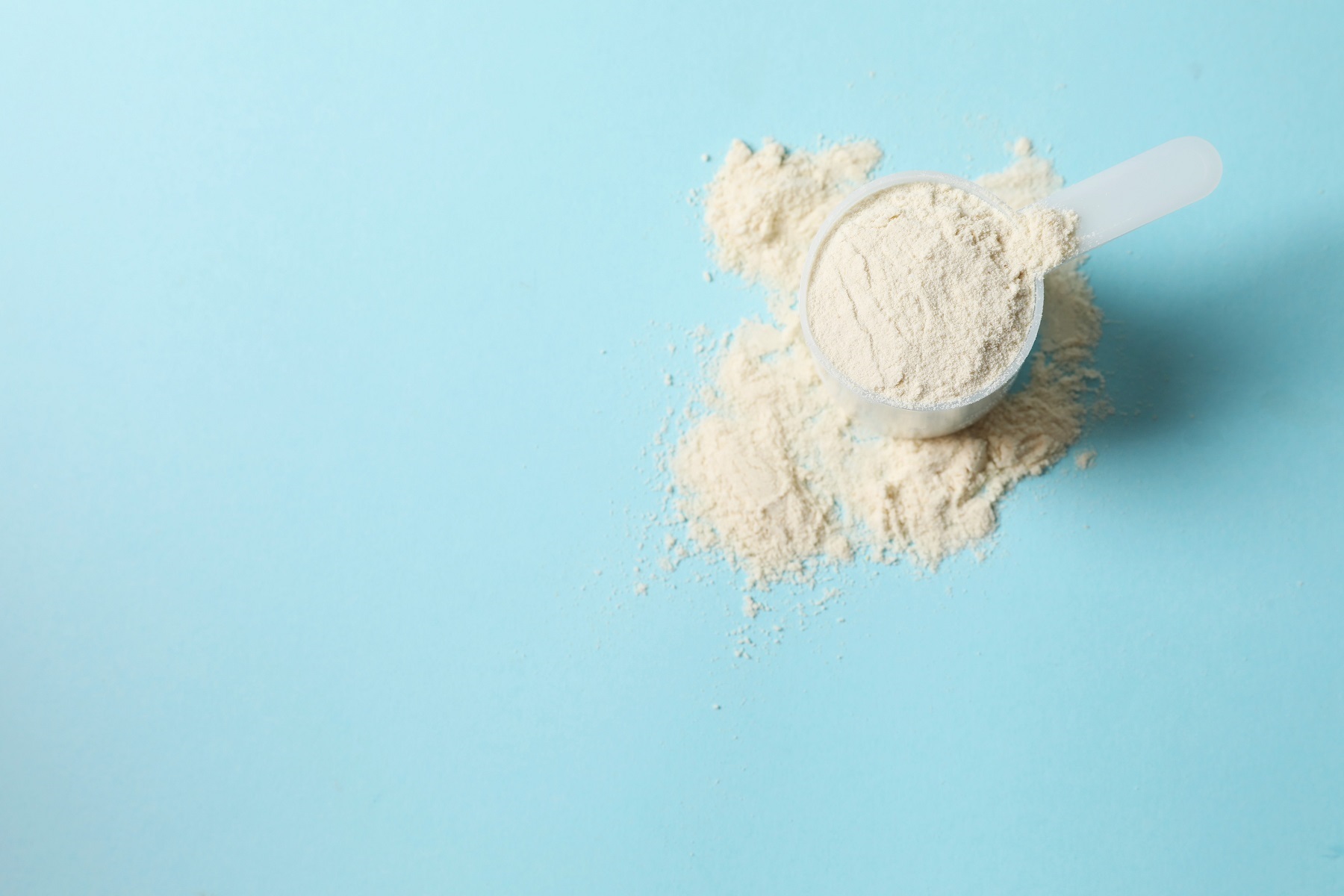Since starting a protein powder blog in 2016, I’ve tried hundreds of protein supplements. This curiosity has become a quest for the best protein powder (or at least a few I can consume regularly with confidence.)
Taste and palatability are major factors that are important in defining “the best.” Choking down a chalky protein powder is simply not sustainable long-term, no matter how healthy it may be.
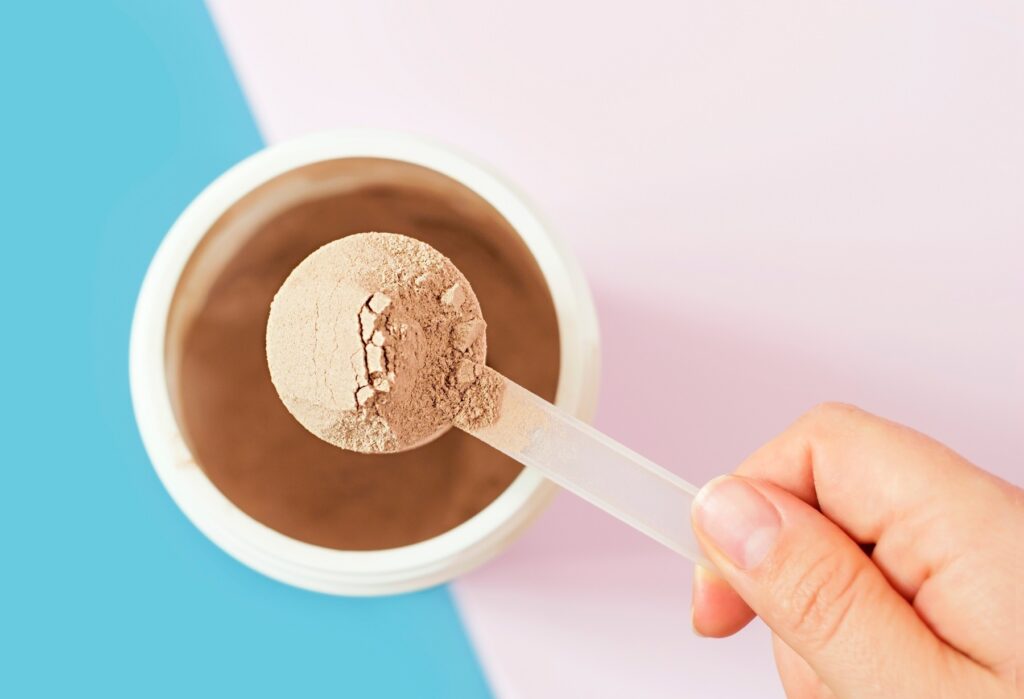
Beyond taste, a product’s ingredients are the most critical consideration. Unfortunately, most protein powders contain artificial ingredients and other non-food substances that our bodies don’t know what to do with.
While claiming a product as the “best protein powder” is subject to opinion, there are some commonly acceptable factors to consider. To strike a balance between taste and nutrition, here I highlight what I’ve found to be the best protein powders and why.
What Defines the Best Protein Powder?
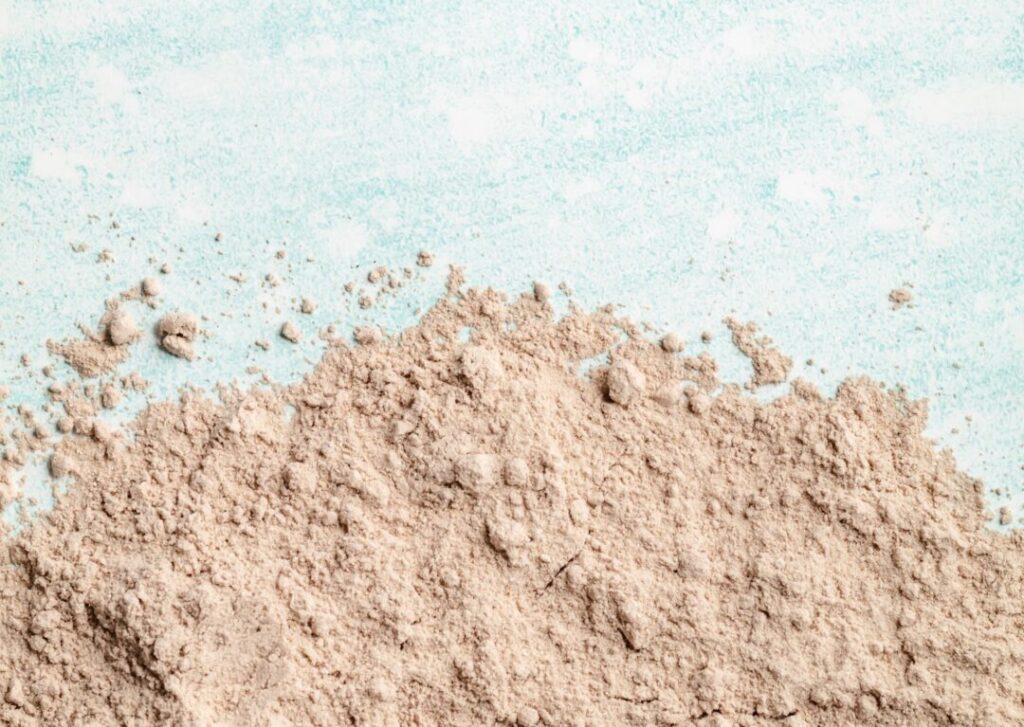
Certain variables have shaped my purchasing decisions regarding the best protein powder:
- Complete amino acid profile high in BCAAs: Aminos are the building blocks of protein, shaping its potency to help you recover. I value protein powders higher in essential and branched-chain amino acids (BCAAs).
- Protein powder without artificial sweeteners: Sucralose, acesulfame potassium (Ace-K), and saccharin are common zero-calorie sweeteners in protein powder. While their health risks are questionable, I avoid these synthetic chemicals at all costs.
- Clean protein powder: Less is more–look for fewer fillers like gums, dextrins, and textural additives lacking nutrition. I also seek protein powders that are third-party tested for heavy metals and contaminants (things you won’t find on the label).
- Best-tasting protein powder: Life’s too short to consume protein powder that’s chalky, gritty, or has a terrible aftertaste. Delicious-tasting protein powder that is creamy, smooth, and balanced is essential to earn my dollar.
- Nutrients aligned with your dietary goals: Some protein powders are zero sugar, keto, paleo, low-FODMAP, high-protein, high-fiber, etc. The best protein powder will align with your lifestyle and dietary objectives, whether you’re prioritizing weight loss, muscle gain, reducing inflammation, or accelerating recovery.
I can’t stress the latter point enough. What may be the best protein powder for one person may be a lousy option for another.
As an endurance athlete, I don’t mind 5 or 6 grams of natural sugar in a scoop of protein powder, as it helps replenish glycogen stores and aids my recovery. (It also tastes a lot better than stevia and monk fruit).
But for someone with diabetes or consuming a ketogenic diet, a low to no-sugar protein powder is generally preferred. Bottom line: the best protein powder for you depends on your dietary needs and health goals.
7 Best Protein Powders In My Recovery Rotation
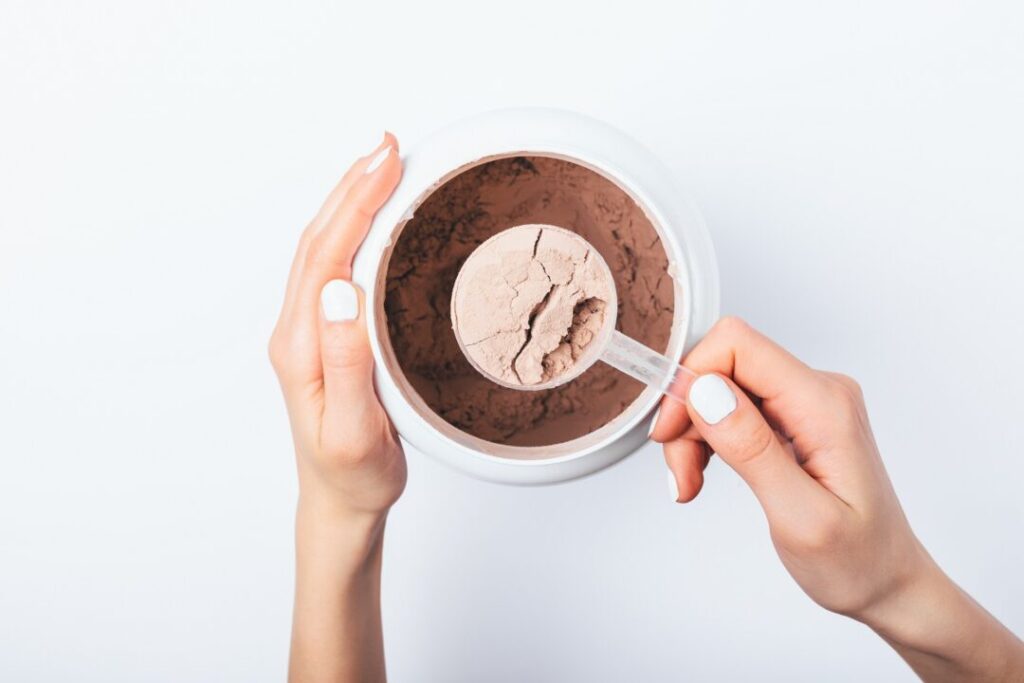
Of the handful of favorites in my recovery rotation, these protein powders deliver a stronger amino acid profile with a cleaner ingredient list. Not to mention, they also taste delicious and offer a wide flavor variety.
1. Birdman Falcon Organic Protein Powder
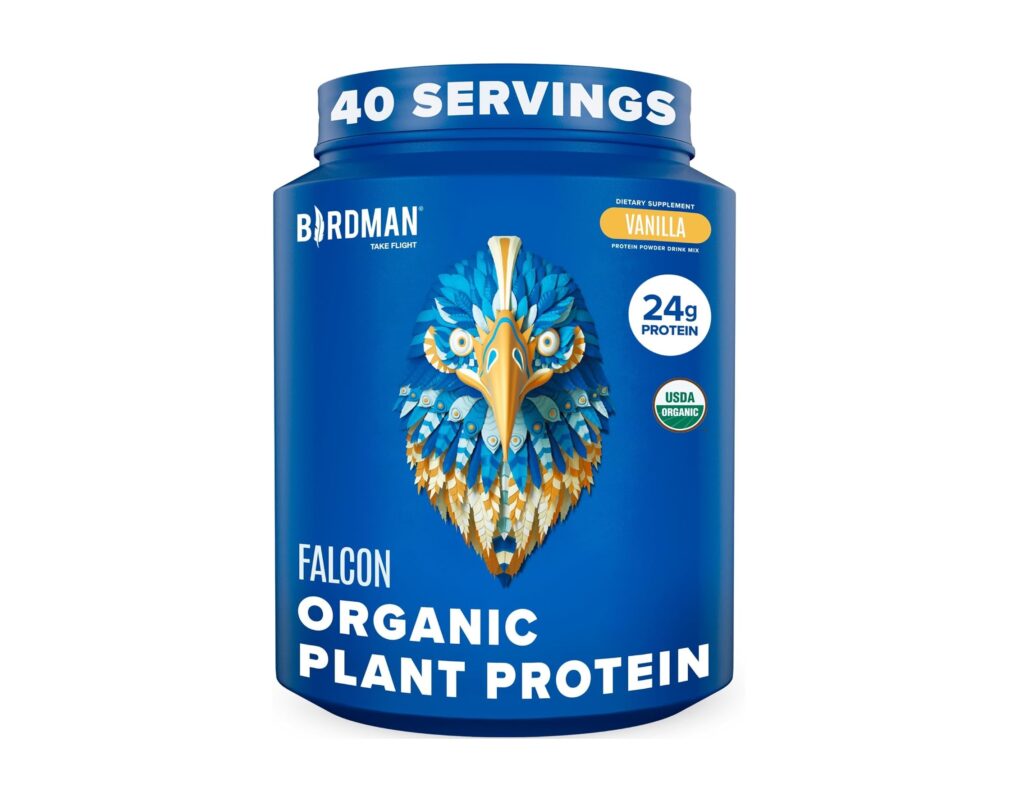
As one of the newest players on the roster, Birdman Falcon is a simple, delicious-tasting option that’s clean and free of sketchy ingredients.
Sweetened with monk fruit extract, this mildly sweet protein powder is smooth and blends well with all types of applications. I’ve been making smoothies with it every other day for the past several months.
Falcon Organic Protein Powder is a minimalist concoction made with just pea protein. I prefer the vanilla, but the chocolate flavor is also wonderful. For an average of $1.50 per scoop, it’s the best protein powder money can buy.
While this blue label product is more than sufficient with 24g of protein per scoop, Falcon Sport offers 31g of protein per scoop, along with 5g of creatine. I enjoy both, but sometimes creatine upsets my stomach, so I go easy with the sport option.
2. Sunwarrior Warrior Blend Protein
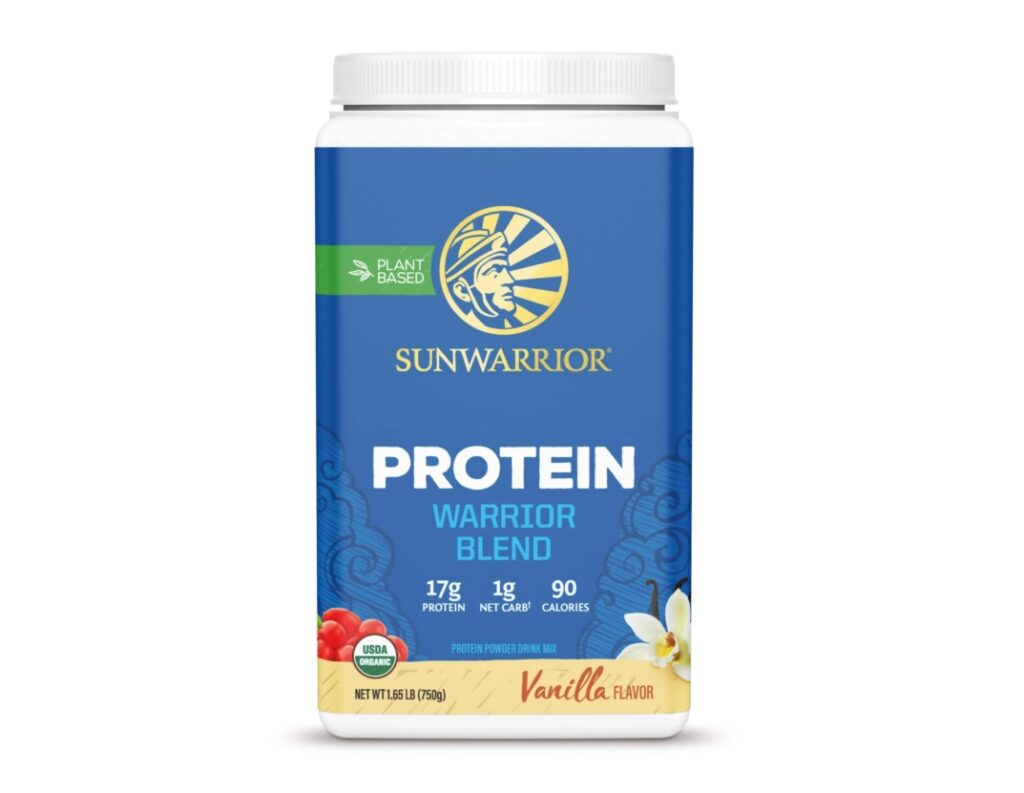
Sunwarrior Warrior Blend is a simple yet effective protein powder that is zero-sugar, low-carb, and low-calorie. Entirely organic, it’s made from pea protein, goji berry, and hemp seed protein, providing a nourishing combination of protein sources.
Available in a variety of flavors, ranging from Vanilla and Berry to Mocha and Maple Toast, each has its unique flavoring agents as well as stevia leaf extract for sweetness. But there is an Unflavored option that’s unsweetened and stevia-free.
Depending on the flavor, one scoop offers between 14g and 19g of protein, so I will usually double up on the serving depending on how I use it. The Vanilla delivers 34g of protein and over 6g of BCAAs in about two scoops.
As a company that stands behind the quality of its products with third-party purity testing, Sunwarrior is one of the best protein powder brands in the business. I never had a Sunwarrior product I didn’t like, and its cleanness speaks for itself.
3. Vivo Life Perform Protein
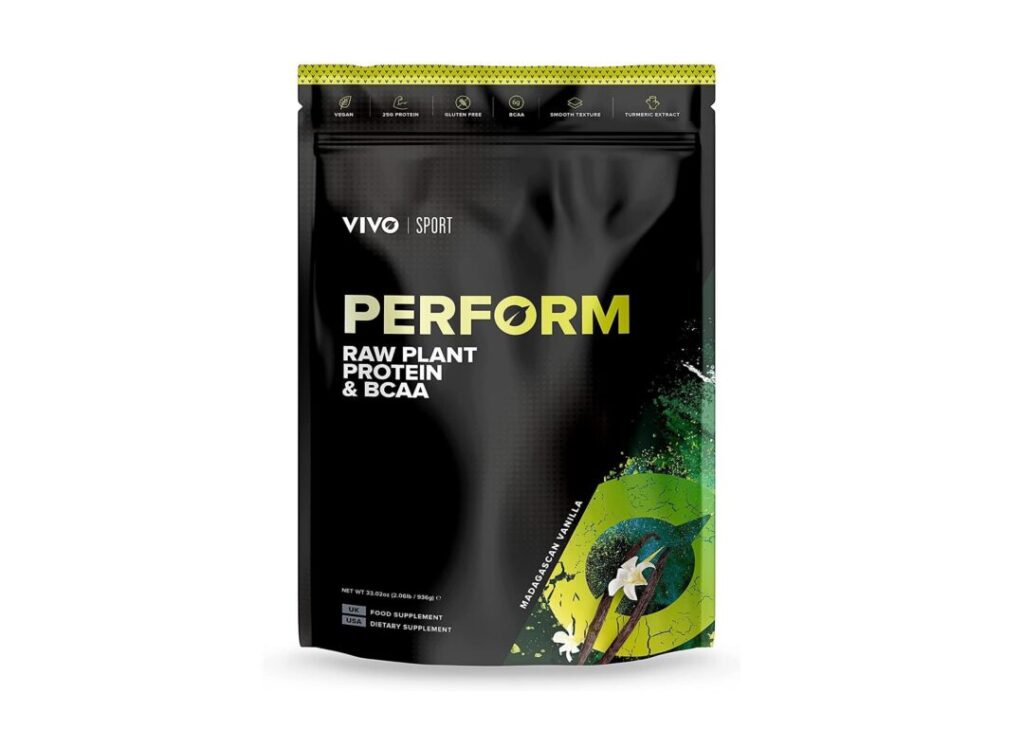
It’s not the most popular option, but Vivo Life Perform deserves high praise for being one of the best. It’s a raw vegan protein blend that combines fermented yellow pea protein and cold-pressed hemp protein, making for a digestive-friendly choice.
One single-scoop serving provides 25g of protein. Infused with Vivo Life’s plant-based BCAA blend, you’re also getting 6g of BCAAs and 3.9g of glutamic acid, which provides a host of benefits for metabolism and immune function.[1] Add to mix turmeric extract, and you’re getting quite the anti-inflammatory recovery supplement.
Although Vivo Life Perform contains stevia extract, it’s not over-powering or has a lingering aftertaste. It’s mildly sweet and mixes well into smoothies, protein shakes, and oatmeal.
I find Madagascan Vanilla to be the best flavor of this protein powder, but it also comes in Cacao, Strawberry & Vanilla, Banana & Cinnamon, and Acai & Blueberry.
Vivo Life also invests in third-party testing of its protein powders, ensuring minimal trace amounts of heavy metals and no harmful contaminants in its products.
4. Truvani Plant-based Protein
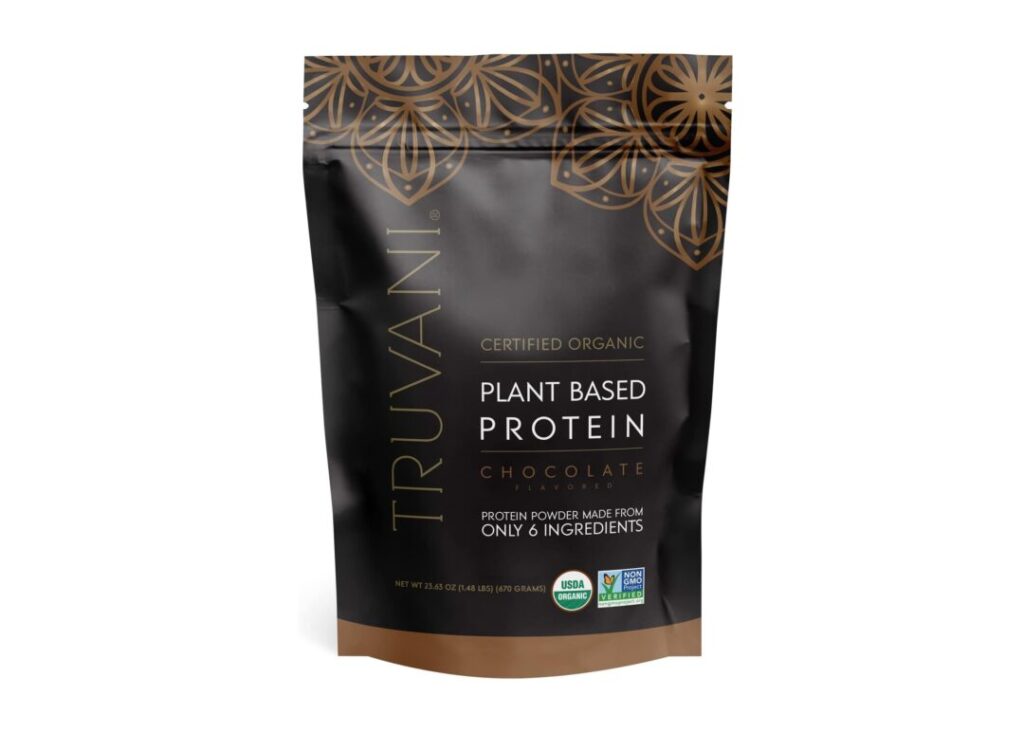
Truly a clean protein powder that doesn’t contain any gums, fillers, additives, or artificial ingredients, Truvani Plant-based Protein is an all-organic podium topper for purity.
Truvani offers a variety of creative flavors, including Pumpkin Spice, Chocolate Peanut Butter, Vanilla Chai, Matcha, and a handful of other regulars. These flavored options use organic monk fruit extract for sweetness, which I find more enjoyable than stevia.
For the minimalists, the unflavored protein powder option has nothing but Truvani’s primary protein sources: pea protein, pumpkin seed, and chia seed protein – all in concentrated form, so less processing is involved compared to isolates.
Based on my own experience and reading other reviews of Truvani Plant-based Protein, it’s very gut-friendly and doesn’t cause any bloating or gas (probably because it’s so clean).
Despite the California Prop 65 warning, which may look concerning, the product is third-party lab tested. It contains tiny trace amounts of heavy metal (no more than your average spinach). I rank it as one of the best protein powders that’s frequently found in my pantry.
5. Garden of Life Sport Protein
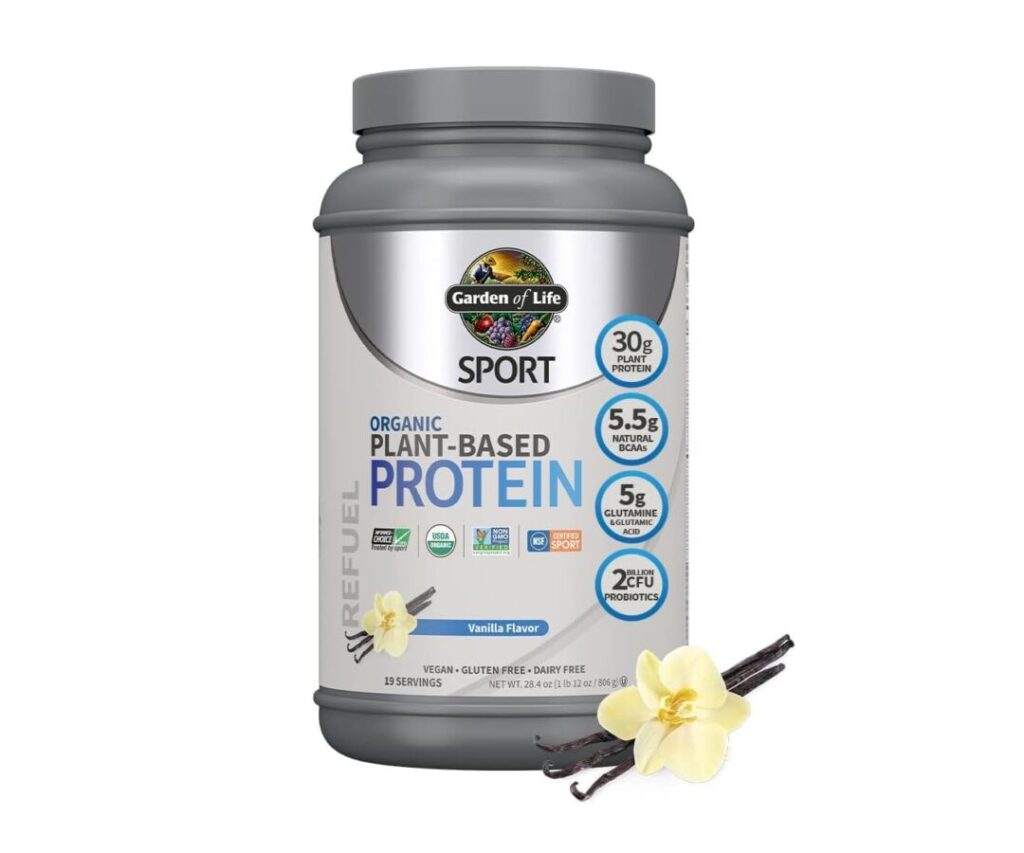
After hard training sessions, Garden of Life Sport Protein is my go-to protein powder, a robust product that packs 30g of protein and 5.5g of BCAAs in a 2-scoop serving. It also has another 5g of glutamine and glutamic acid, a 2 billion CFU of probiotics.
The post-workout fueling doesn’t stop there. Garden of Life Sport also contains a recovery blend with apple, tart cherry, turmeric, blueberry, and goji berry–a powerful combination of antioxidants and anti-inflammatory foods. Every ingredient in this protein powder is organic.
The performance protein blend uses a unique combination of pea protein, sprouted navy bean, sprouted lentil bean, sprouted garbanzo bean, and cranberry protein. The sprouted nature of these legume proteins delivers increased bioavailability of amino acids and improved digestibility.[2]
Very low in sugar with <1g, this protein powder is sweetened with stevia leaf extract; however, the taste is pretty mellow and smooth. There are just two flavor options, Vanilla and Chocolate, and both are fantastic, depending on what you prefer most.
6. Orgain Simple Protein Powder
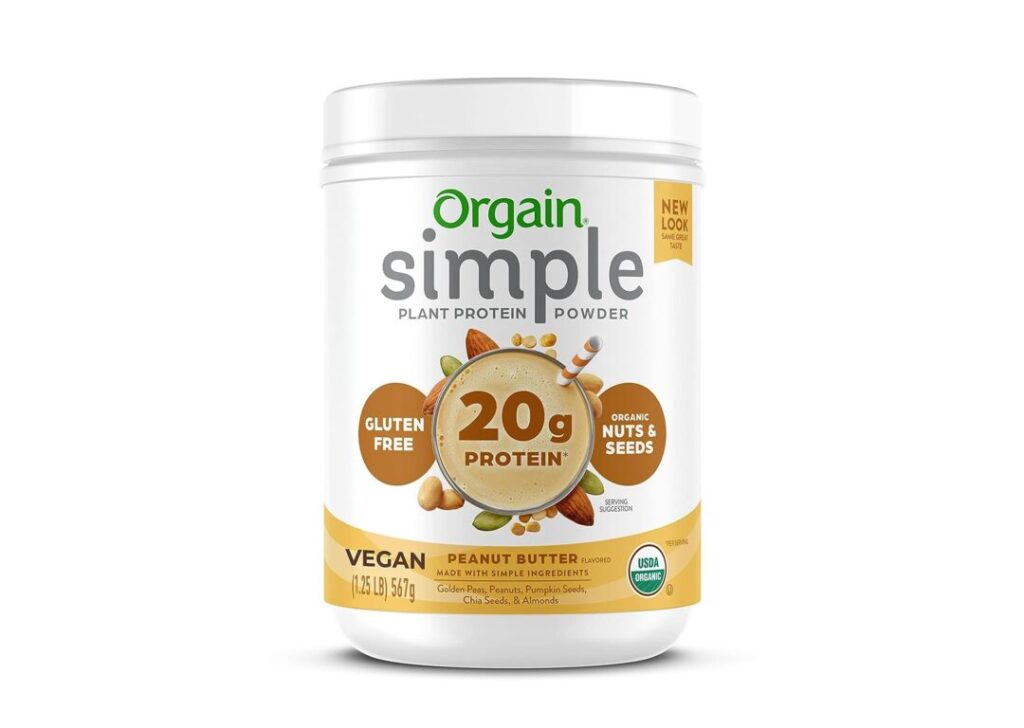
Orgain is one of the most prolific brands that you’ll find at almost any major grocery chain. Unfortunately, many of Orgain’s protein powders contain stevia leaf extract along with erythritol, a sugar alcohol that carries cardiovascular health concerns, according to a recent study.[3]
Orgain Simple Protein shines through as a much cleaner, better-tasting option that uses real organic coconut sugar versus synthetic alternatives. Coconut sugar has a significantly lower glycemic index compared to table sugar, so it doesn’t spike your body’s glucose, or blood sugar, quite as dramatically.[4]
The Orgain Organic Protein Blend contains pea protein, peanut flour, pumpkin seed protein, almond protein, and chia. While Orgain doesn’t list the amino acid profile, it’s safe to assume this diverse protein blend offers all essential amino acids and BCAAs.
Given its macronutrient composition, Orgain Simple Protein contains more carbohydrates than your average protein powder (11g total). For some, this may be a deal-breaker. But for athletes like me, a little extra carbs is a welcome addition that accommodates my recovery objectives.
Orgain Simple Protein is one of the best-tasting protein powders money can buy. It comes in Vanilla, Chocolate, and Peanut Butter flavors–all of which have a creamy texture and malty taste I love. It’s no secret this is one of my favorites.
7. Vega Sport Protein Powder
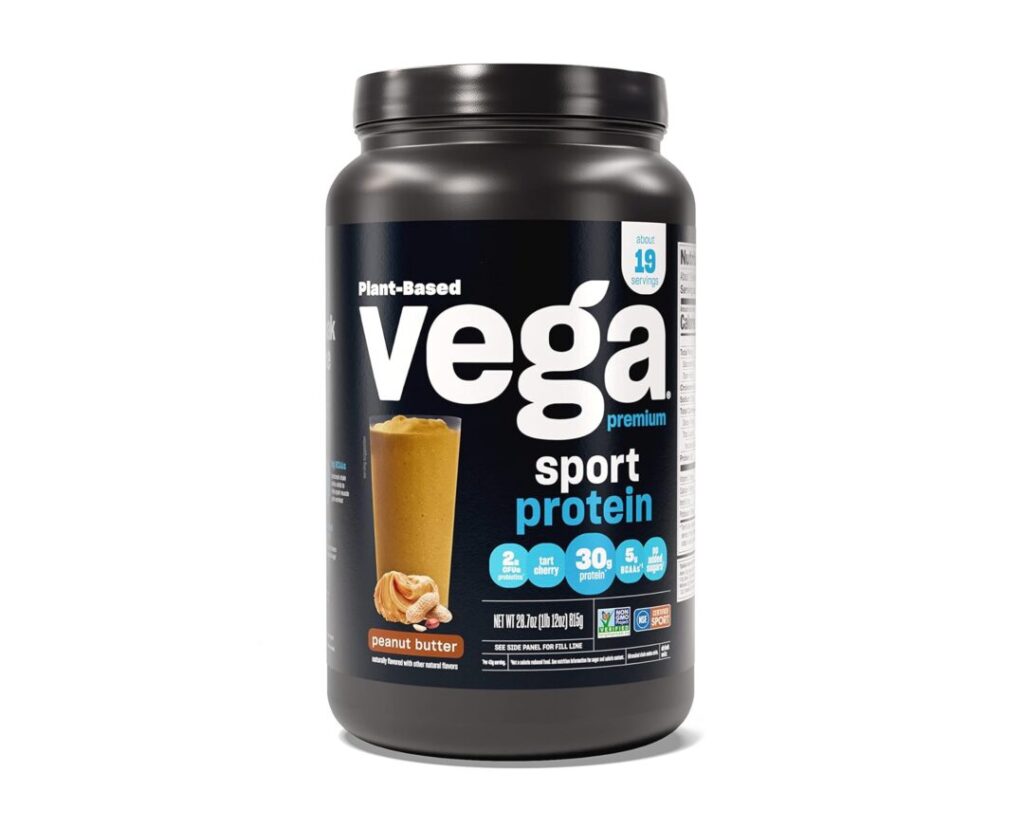
When I’m craving a sweeter alternative to Garden of Life Sport, I often turn to Vega Sport Protein. Although it’s not entirely organic or as clean, it offers a similar level of protein and BCAAs to support my recovery.
It has 30g of protein and 5g of BCAAs in a large single-scoop serving. Add to the mix 2 billion CFUs of probiotics, turmeric, bromelain, and tart cherry, and Vega Sport is an optimized protein powder designed with athletes in mind.
The protein sources are pea protein, pumpkin seed protein, alfalfa protein, and sunflower seed protein. The only downside is that “natural flavors” are the second ingredient, which is a little questionable.
Vega Sport Protein also uses stevia leaf extract, which is pretty sweet. If you’re sensitive to it, this protein powder may not be the best option.
Vega has evolved the flavor options in this Sport Protein line-up. In addition to Vanilla, Chocolate, and Peanut Butter (which is my favorite), there are now Mocha and Berry options as well.
For quality, performance protein powder, Vega Sport offers excellent value at the price.
Honorable Mentions: Next Best Protein Powders
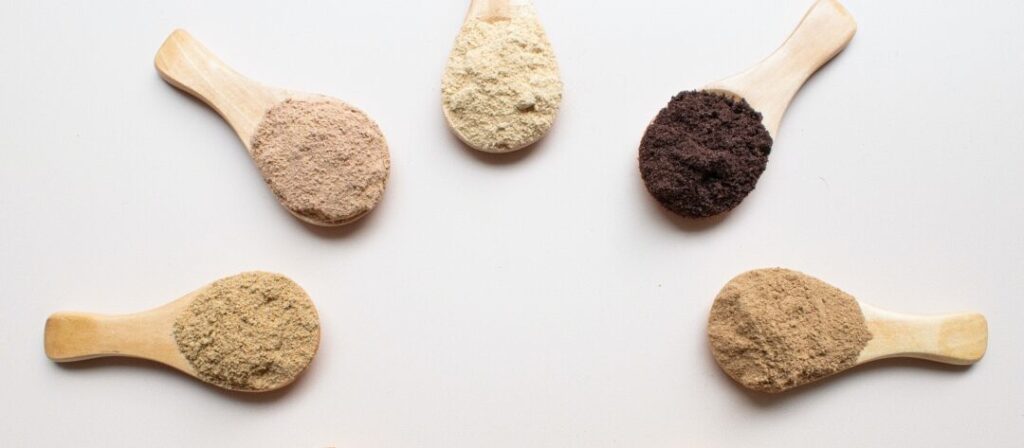
To wrap up my best protein powder picks, I can’t leave out a handful of honorable mentions. These are also fantastic products that I regularly consume.
- OWYN Plant-based Protein: It uses natural sugar plus monk fruit extract for a delicious taste. OWYN is also third-party tested and cares about the cleanliness of its products.
- MRM Veggie Elite: A simple, keto-friendly protein powder that uses pea and brown rice protein, MRM Veggie Elite is a performance-minded option that packs a punch for the price.
- PlantFusion Complete Protein: Nutritionally dense and zero sugar, PlantFusion Complete Protein is a creamy and delicious protein powder that’s allergen and digestion-friendly.
- PB2 Performance Peanut Protein: Incredibly rich and decadent, PB2 Performance is a peanut butter protein powder that includes brown rice for a complete blend with all essential aminos.
Unlike many “best protein powders” round-ups, these are all products I’ve tried, examined, and enjoyed. I have direct experience with these protein powders and stand by these picks for their nutritional qualities and great taste.
Do you have any favorite protein powders you consider the best? Leave a comment below or contact me directly.
Scientific References
- Cruzat V, Macedo Rogero M, Noel Keane K, Curi R, Newsholme P. Glutamine: Metabolism and Immune Function, Supplementation and Clinical Translation. Nutrients. 2018 Oct 23;10(11):1564. doi: 10.3390/nu10111564. PMID: 30360490; PMCID: PMC6266414.
- Bera I, O’Sullivan M, Flynn D, Shields DC. Relationship between Protein Digestibility and the Proteolysis of Legume Proteins during Seed Germination. Molecules. 2023 Apr 4;28(7):3204. doi: 10.3390/molecules28073204. PMID: 37049968; PMCID: PMC10096060.
- Witkowski, M., Nemet, I., Alamri, H. et al. The artificial sweetener erythritol and cardiovascular event risk. Nat Med 29, 710–718 (2023). https://doi.org/10.1038/s41591-023-02223-9
- Saraiva A, Carrascosa C, Ramos F, Raheem D, Lopes M, Raposo A. Coconut Sugar: Chemical Analysis and Nutritional Profile; Health Impacts; Safety and Quality Control; Food Industry Applications. Int J Environ Res Public Health. 2023 Feb 19;20(4):3671. doi: 10.3390/ijerph20043671. PMID: 36834366; PMCID: PMC9964017.
